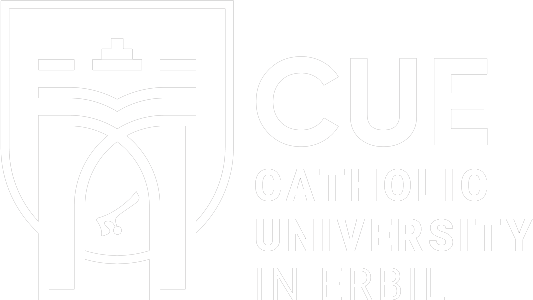
The Catholic University in Erbil (CUE) consists of a diverse community of academics, scholars, scientists, and administrators responsible for providing high-quality education in various fields. The primary objectives of QA are to ensure that high-quality education is delivered, to guarantee that academic standards are met and recognized internationally, and to provide students with skills and knowledge applicable to the local and international job market.
Mission
The QA is committed to meeting all the academic expectations outlined in the CUE strategy and the Ministry of Higher education regulations in Kurdistan. The QA program is based on creating a working atmosphere that encourages building trust, learning, researching, and publishing.
Vision
The vision of CUE is to be internationally recognized as one of the best universities delivering the highest quality education.
Targets
CUE targets are to attain the University’s priorities on quality and academic accreditation issues, reinforce efforts to transfer the University locally and regionally to the ranks of the best universities academically and professionally, foster a culture of excellence among the University’s members, track the academic and administrative units’ performance evaluation and quality assurance, and to provide high-quality research knowledge and resources, data analysis, decision support, and institutional performance strategic planning.
Quality Assurance (TQA) for Teaching
Reporting, tracking, record keeping, and decision-making are TQA concerns, in addition to the actual content of our teaching (curriculum) and the actual methods of teaching. The top steps in the TQA process are evaluation and peer review.
The quality of the education process is followed using different techniques and is based on real evidence and data obtained from all involved parties (students, supervisors, managers).
CUE believes active participation is the best and most effective method of updating education. This can only be achieved through research, analysis, and presenting research outcomes in seminars organized by different departments and faculty. Periodically, All faculty are required to conduct academic events, including seminars, workshops, symposiums, conferences, and scientific visits. In addition, the athletic events can be done together by the students and the faculty.
Research Publication Policies
Policies aim to help CUE professors, researchers, and teachers make informed decisions about how to disseminate the results of their scholarly work best to have the greatest possible positive influence on their careers and the CUE’s reputation as a whole. This policy should be considered and followed by all academics, research and teaching staff, and postgraduate students at the CUE.
- Publications by CUE faculty, researchers, and permanent instructors must include the CUE as an initial affiliation.
- Members of the adjunct or part-time teaching staff who are not internal university employees can add their CUE affiliations as either principal or secondary.
- Without a CUE affiliation, scholarly publications by CUE research and teaching employees are a lost chance to raise the University’s profile. Also, these publications are not eligible for consideration in the National University Ranking (NUR-MHE) or the International University Rankings.
- Any academics, researchers, and teaching staff should use the following standardized Author’s affiliation.
Name of the Author
(Department of xxxxxxx, College of xxxxxxx, Catholic University in Erbil, Erbil, Iraq).
- Academics, research staff, and teachers can publish the outcomes of their research wherever they want.
- CUE would encourage all academic staff publications in High IF Clarivate Analytics and SCOPUS-indexed journals. Academic staff should avoid publishing in non-indexed journals, and it is forbidden to publish in non-standard (Fake) or predatory journals.
- If the Author appears in the third order and further (permanent and external staff), the reward will be deducted 30%.
- For External Staff, If CUE appears as the second affiliation, the incentive/ reward will be deducted 40%.
- All the journals must be listed in the most updated MHERS list and approved by NUR.
- Patents should be registered in the World Intellectual Property Organization (WIPO) database. Use the following link to access the WIPO database to validate the patent number: https://patentscope.wipo.int/search/en/search.jsf.
- Publications of Scientific Books and Scientific Book Chapters – All published books/chapters must include a valid International Book Serial Number (ISBN) with a thirteen-digit standard code. Use http://www.isbnsearch.org or http://wokinfo.com/mbl/publishers/ to validate the ISBN.
- National/International Conferences with Indexed Proceedings, National/International Conferences without Proceedings, but some papers published in indexed journals are accepted.
- You can check the attached Excel file for the updated list of journals with the Clarivate impact factor. You can also visit the Clarivate website to check journals with impact factor (Expanded) or indexed in Clarivate but without impact factor (emerging): https://mjl.clarivate.com/search-results
- Use the following link to validate the journal indexing by SCOPUS: https://www.scopus.com/sources.
- Resources
- Ranking Web of Universities (Webometrics): http://www.webometrics.info/en
- National University Ranking (NUR-KRG): http://nur-krg.net/
- Clarivate Analytics: http://clarivate.com/
- SCOPUS: https://www.scopus.com/
- Directory of Open Access Scholarly Resources (ROAD): http://road.issn.org/
- World Intellectual Property Organization (WIPO): https://patentscope.wipo.int/search/en/search/jsf
- International Standard Book Number (ISBN): http://www.isbn.org/


